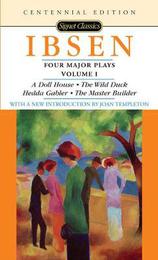
|
Four Major Plays Vol.1: Centennial Edition
Paperback / softback
Main Details
| Title |
Four Major Plays Vol.1: Centennial Edition
|
| Authors and Contributors |
By (author) Henrik Ibsen
|
|
By (author) Rolf Fjelde
|
|
By (author) Joan Templeton
|
| Physical Properties |
| Format:Paperback / softback | | Pages:400 | | Dimensions(mm): Height 175,Width 105 |
|
| Category/Genre | Drama
Plays, playscripts |
|---|
| ISBN/Barcode |
9780451530226
|
| Classifications | Dewey:839.8226 |
|---|
| Audience | |
|---|
|
Publishing Details |
| Publisher |
Penguin Putnam Inc
|
| Imprint |
Signet Classics
|
| Publication Date |
6 June 2006 |
| Publication Country |
United States
|
Description
Among the greatest and best known of Ibsen's works , these four plays brilliantly exemplify his landmark contributions to the theatre: his realistic dialogue, probing of social problems and depiction of characters' inner lives as well as their actions. Rich in symbolism and often autobiographical, each deals convincingly and provocatively with such universal themes as greed, fear and sexual hostility, and confronts the eternal conflict between reality and illusion. Includes A Doll House, The Wild Duck, Hedda Gabler & The Master Builder.
Author Biography
Henrik Ibsen was born of well-to-do parents at Skien, a small Norwegian coastal town, on March 20, 1828. In 1836 his father went bankrupt, and the family was reduced to near poverty. At the age of fifteen, he was apprenticed to an apothecary in Grimstad. In 1850 Ibsen ventured to Christiania-present-day Oslo-as a student, with the hope of becoming a doctor. On the strength of his first two plays he was appointed 'theater-poet' to the new Bergen National Theater, where he wrote five conventional romantic and historical dramas and absorbed the elements of his craft. In 1857 he was called to the directorship of the financially unsound Christiania Norwegian Theater, which failed in 1862. In 1864, exhausted and enraged by the frustration of his efforts toward a national drama and theater, he quit Norway for what became twenty-seven years of voluntary exile abroad. In Italy he wrote the volcanic Brand (1866), which made his reputation and secured him a poet's stipend from the government. Its companion piece, the phantasmagoric Peer Gynt, followed in 1867, then the immense double play, Emperor and Galilean (1873), expressing his philosophy of civilization. Meanwhile, having moved to Germany, Ibsen had been searching for a new style. With The Pillars of Society he found it; this became the first of twelve plays, appearing at two-year intervals, that confirmed his international standing as the foremost dramatist of his age. In 1900 Ibsen suffered the first of several strokes that incapacitated him. He died in Oslo on May 23, 1906.
|